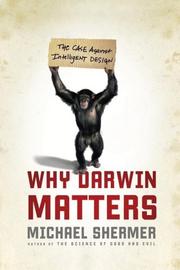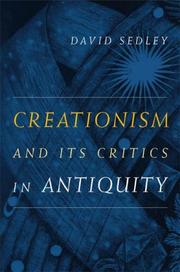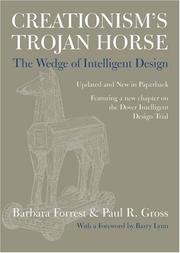| Listing 1 - 10 of 11 | << page >> |
Sort by
|
Book
Year: 1924 Publisher: [London] : The Theosophical Society in England,
Abstract | Keywords | Export | Availability | Bookmark
 Loading...
Loading...Choose an application
- Reference Manager
- EndNote
- RefWorks (Direct export to RefWorks)
Théosophie --- Dessein intelligent. --- Évolutionnisme --- Aspect religieux
Book
ISBN: 9781840468045 1840468041 Year: 2008 Publisher: Thriplow : Icon Books,
Abstract | Keywords | Export | Availability | Bookmark
 Loading...
Loading...Choose an application
- Reference Manager
- EndNote
- RefWorks (Direct export to RefWorks)
Intelligent design (Teleology) --- Evolution (Biology) --- Dessein intelligent --- Evolution (Biologie)

ISBN: 9780805081213 0805081216 Year: 2006 Publisher: New York : Times Books,
Abstract | Keywords | Export | Availability | Bookmark
 Loading...
Loading...Choose an application
- Reference Manager
- EndNote
- RefWorks (Direct export to RefWorks)
Book
Year: 1999 Publisher: Downers Grove, Ill. : InterVarsity Press,
Abstract | Keywords | Export | Availability | Bookmark
 Loading...
Loading...Choose an application
- Reference Manager
- EndNote
- RefWorks (Direct export to RefWorks)
Religion and science. --- Intelligent design (Teleology) --- God --- Naturalism. --- Religion et sciences. --- Dessein intelligent. --- Dieu --- Naturalisme (philosophie) --- Proof, Cosmological. --- Existence --- Preuve cosmologique.

ISBN: 9780520253643 0520253647 Year: 2007 Volume: 66 Publisher: Berkeley University of California press
Abstract | Keywords | Export | Availability | Bookmark
 Loading...
Loading...Choose an application
- Reference Manager
- EndNote
- RefWorks (Direct export to RefWorks)
The world is configured in ways that seem systematically hospitable to life forms, especially the human race. Is this the outcome of divine planning or simply of the laws of physics? Ancient Greeks and Romans famously disagreed on whether the cosmos was the product of design or accident. In this book, David Sedley examines this question and illuminates new historical perspectives on the pantheon of thinkers who laid the foundations of Western philosophy and science. Versions of what we call the "creationist" option were widely favored by the major thinkers of classical antiquity, including Plato, whose ideas on the subject prepared the ground for Aristotle's celebrated teleology. But Aristotle aligned himself with the anti-creationist lobby, whose most militant members--the atomists--sought to show how a world just like ours would form inevitably by sheer accident, given only the infinity of space and matter. This stimulating study explores seven major thinkers and philosophical movements enmeshed in the debate: Anaxagoras, Empedocles, Socrates, Plato, the atomists, Aristotle, and the Stoics.
Creationism --- Intelligent design (Teleology) --- Philosophy, Ancient. --- Créationnisme --- Dessein intelligent --- Philosophie ancienne --- Intelligent design (Teleology). --- Philosophy, Ancient --- Ancient philosophy --- Greek philosophy --- Philosophy, Greek --- Philosophy, Roman --- Roman philosophy --- Design, Intelligent (Teleology) --- Natural theology --- Philosophy of nature --- Teleology --- God --- Proof, Teleological --- Créationnisme --- Philosophie antique
Book
ISBN: 9780521190466 0521190460 9780521148863 0521148863 9780511760914 9780511932663 0511932669 0511760914 0511852517 1107203910 1282908243 9786612908248 051193131X 0511927479 0511924933 0511929986 Year: 2010 Publisher: New York Cambridge University Press
Abstract | Keywords | Export | Availability | Bookmark
 Loading...
Loading...Choose an application
- Reference Manager
- EndNote
- RefWorks (Direct export to RefWorks)
"Based on their survey of high school biology teachers, Michael Berkman and Eric Plutzer show that it is individual educators who often make critical decisions about what children are taught about evolution"--Provided by publisher. "Who should decide what children are taught in school? This question lies at the heart of the evolution-creation wars that have become a regular feature of the U.S. political landscape. Ever since the 1925 Scopes "monkey trial" many have argued that the people should decide by majority rule and through political institutions; others variously point to the federal courts, educational experts, or scientists as the ideal arbiter. Michael Berkman and Eric Plutzer illuminate who really controls the nation's classrooms. Based on their innovative survey of 926 high school biology teachers they show that the real power lies with individual educators who make critical decisions in their own classrooms. Broad teacher discretion sometimes leads to excellent instruction in evolution. But the authors also find evidence of strong creationist tendencies in America's public high schools. More generally, they find evidence of a systematic undermining of science and the scientific method in many classrooms"--Provided by publisher.
Evolution --- Creationism --- Intelligent design (Teleology) --- Créationisme --- Dessein intelligent --- Study and teaching (Primary) --- Etude et enseignement (Primaire) --- 213 --- Schepping. Emanatisme. Evolutionisme. Creationisme. Eeuwigheid van de wereld --- Créationisme --- Human evolution --- Design, Intelligent (Teleology) --- Creation science --- Scientific creationism --- Natural theology --- Philosophy of nature --- Teleology --- God --- Evolution (Biology) --- Physical anthropology --- Evolutionary psychology --- Human beings --- Modernist-fundamentalist controversy --- Bible and evolution --- Creation --- Proof, Teleological --- Origin --- Religious aspects --- Christianity --- Social Sciences --- Political Science

Abstract | Keywords | Export | Availability | Bookmark
 Loading...
Loading...Choose an application
- Reference Manager
- EndNote
- RefWorks (Direct export to RefWorks)
Architecture intelligente (Téléologie) --- Christianisme et science --- Christianisme et sciences --- Christianity and science --- Conception intelligente (Téléologie) --- Création intelligente (Téléologie) --- Design [Intelligent ] (Teleology) --- Dessein intelligent (Téléologie) --- Geology -- Religious aspects --- Geology and religion --- Godsdienst en wetenschap --- Géologie et religion --- Intelligent design (Teleology) --- Intelligent ontwerp (Teleologie) --- Materialism --- Materialisme --- Matérialisme --- Modèle intelligent (Téléologie) --- Physicalism --- Rationalism --- Rationalisme --- Reductionism --- Reductionisme --- Reductionnisme --- Religion and science --- Religion et science --- Religion et sciences --- Religion et sciences naturelles --- Religion et technologie --- Religions et sciences --- Science -- Religious aspects --- Science and religion --- Science et christianisme --- Science et religion --- Sciences et christianisme --- Sciences et religion --- Sciences et religions --- Sciences naturelles et religion --- Technologie et religion --- Wetenschap en godsdienst --- Materialism. --- Rationalism. --- Reductionism. --- Religion and science. --- Intelligent design (Teleology).

ISBN: 9780195319736 9780195157420 0195319737 0195157427 019988269X 0198035780 1602568944 128050269X Year: 2004 Publisher: Oxford Oxford university press
Abstract | Keywords | Export | Availability | Bookmark
 Loading...
Loading...Choose an application
- Reference Manager
- EndNote
- RefWorks (Direct export to RefWorks)
Forrest and Gross expose the scientific failure, the religious essence, and the political ambitions of ""intelligent design"" creationism. They examine the movement's ""Wedge Strategy,"" which has advanced and is succeeding through public relations rather than through scientific research. Analyzing the content and character of ""intelligent design theory,"" they highlight its threat to public education and to the separation of church and state.
Creationism --- Evolution (Biology) --- Intelligent design (Teleology) --- Créationnisme --- Evolution (Biologie) --- Dessein intelligent --- Religious aspects --- Christianity. --- Study and teaching --- Aspect religieux --- Christianisme --- Center for Science & Culture --- 213 --- Schepping. Emanatisme. Evolutionisme. Creationisme. Eeuwigheid van de wereld --- Intelligent design (Teleology). --- Créationnisme --- Center for Science & Culture. --- Design, Intelligent (Teleology) --- Animal evolution --- Animals --- Biological evolution --- Darwinism --- Evolutionary biology --- Evolutionary science --- Origin of species --- Creation science --- Scientific creationism --- Religious aspects&delete& --- Christianity --- Evolution --- Center for Science and Culture --- Discovery Institute. --- Natural theology --- Philosophy of nature --- Teleology --- God --- Biology --- Biological fitness --- Homoplasy --- Natural selection --- Phylogeny --- Modernist-fundamentalist controversy --- Bible and evolution --- Creation --- Proof, Teleological --- Anti-evolutionism --- Antievolutionism
Book
ISBN: 9781107538856 9780521197748 0521197740 9780511762499 9780511902000 051190200X 051185059X 1107205344 1282770659 9786612770654 0511901216 0511798857 0511797451 0511762496 0511900422 1107538858 Year: 2010 Publisher: Cambridge Cambridge University Press
Abstract | Keywords | Export | Availability | Bookmark
 Loading...
Loading...Choose an application
- Reference Manager
- EndNote
- RefWorks (Direct export to RefWorks)
"In Aristotle's teleological view of the world, natural things come to be and are present for the sake of some function or end (for example, wings are present in birds for the sake of flying). Whereas much of recent scholarship has focused on uncovering the (meta-)physical underpinnings of Aristotle's teleology and its contrasts with his notions of chance and necessity, this book examines Aristotle's use of the theory of natural teleology in producing explanations of natural phenomena. Close analyses of Aristotle's natural treatises and his Posterior Analytics show what methods are used for the discovery of functions or ends that figure in teleological explanations, how these explanations are structured, and how well they work in making sense of phenomena. The book will be valuable for all who are interested in Aristotle's natural science, his philosophy of science, and his biology"-- "Why do organisms reproduce? Why do birds have wings? Why do neither snakes nor stars have feet? And why do most of the hoofed life-bearing animals have horns (but not all of them)? For Aristotle, questions such as these go to the heart of natural philosophy, which is the study of the coming to be and presence of beings that have their own internal principle of change and rest. Throughout his lifetime, Aristotle was deeply committed to investigating and explaining natural phenomena, which is reflected all through the surviving treatises on natural philosophy. Among these, Aristotle's Physica is most fundamental. In this treatise, Aristotle lays out the general theoretical framework for his natural philosophy, defining notions such as nature, motion, causation, place, and time. In the other treatises, Aristotle explores more specific problems related to the study of natural beings, such as coming to be and passing away (in De Generatione et Corruptione), the nature and motion of the elements (in De Generatione et Corruptione and the second part of the De Caelo), the motions and features of the heavenly bodies (in the first part of the De Caelo), atmospheric causes and changes (in the Meteorologica), the notion of soul and its dependence on natural bodies (in De Anima), and finally, the causes of the coming to be and presence of living beings and of their parts and motions (in the biological works)"--
Intelligent design (Teleology) --- Aristotle --- Philosophy of nature --- Dessein intelligent --- Nature --- Nature, Philosophy of --- Natural theology --- Design, Intelligent (Teleology) --- Teleology --- Creationism --- God --- Philosophy --- Proof, Teleological --- Aristotle. --- Aristoteles --- Aristote --- Aristotile --- Aristoteles. --- Philosophy of nature. --- Philosophie de la nature --- Arisṭāṭṭil --- Aristo, --- Aristotel --- Aristotele --- Aristóteles, --- Aristòtil --- Arisṭū --- Arisṭūṭālīs --- Arisutoteresu --- Arystoteles --- Ya-li-shih-to-te --- Ya-li-ssu-to-te --- Yalishiduode --- Yalisiduode --- Ἀριστοτέλης --- Αριστοτέλης --- Аристотел --- ארסטו --- אריםטו --- אריסטו --- אריסטוטלס --- אריסטוטלוס --- אריסטוטליס --- أرسطاطاليس --- أرسططاليس --- أرسطو --- أرسطوطالس --- أرسطوطاليس --- ابن رشد --- اريسطو --- Pseudo Aristotele --- Pseudo-Aristotle --- アリストテレス --- Arts and Humanities --- Aristote (0384-0322 av. J.-C.) --- Critique et interprétation --- Critique et interprétation
Book
ISBN: 2889154521 9782889154524 Year: 2022 Publisher: Lausanne EPFL Press
Abstract | Keywords | Export | Availability | Bookmark
 Loading...
Loading...Choose an application
- Reference Manager
- EndNote
- RefWorks (Direct export to RefWorks)
Au cours de son histoire, la science a livré de nombreux combats. À la Renaissance, Galilée a été condamné par le tribunal de l'Inquisition. Depuis lors, le Vatican a fait amende honorable, mais il est des idéologies plus profondément ancrées qui refusent de s'incliner devant les arguments scientifiques. Tel le racisme, qui a fait tant de mal au genre humain mais qui continue pourtant d'empoisonner nos sociétés. Quant au spécimen qui imprégnait le 19e siècle, il a subi un coup dur lorsque Darwin a publié L'Origine des espèces. Au grand dam des créationnistes, l'homme cessait alors de se considérer comme un être à part, directement issu de la volonté divine. Quant aux extraterrestres, suspectés un temps d'avoir capturé des terriens à bord de leurs ovnis ou participé à l'érection des pyramides, la science les a également remis à leur place.
Controverses scientifiques --- Science --- science --- extraterrestres --- géocentrisme --- héliocentrisme --- géoglyphes --- agroglyphes --- crop circles --- soucoupes volantes --- UFOs --- ovnis --- paradoxe de Fermi --- Search for Extraterrestrial Intelligence (SETI) --- racisme --- race humaine --- concept de race --- classification linnéenne --- Louis Agassiz (1807-1873) --- acide désoxyribonucléique (ADN) --- science et religion --- Galilée (1564-1642) --- Nicolas Copernic (1473-1543) --- Charles Darwin (1809 - 1882) --- dessein intelligent --- pseudoscience --- pseudo-science --- créationnisme --- intelligent design --- Trofim Lysenko (1898-1976) --- lyssenkisme --- vernalisation --- communisme --- nazisme --- juives --- antisémitisme --- Philipp Lenard (1862-1947) --- Johannes Stark (1874-1957) --- postmodernisme --- relativisme cognitif --- erreurs de la science --- fraudes scientifiques --- Trofim Lyssenko (1898-1976)
| Listing 1 - 10 of 11 | << page >> |
Sort by
|

 Search
Search Feedback
Feedback About UniCat
About UniCat  Help
Help News
News